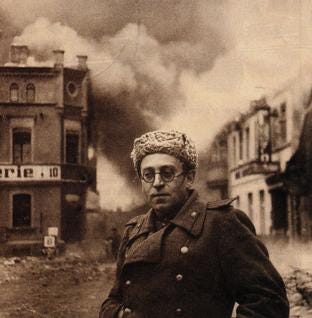Vasily Grossman documented the horrors of Treblinka
Thanks to A Writer at War, the 2005 compilation of his wartime notebooks, Vasily Grossman may be the best-known Russian chronicler of the war to western audiences.
Born Iosif Grossman in Berdychiv, Ukraine, on Dec. 12, 1905, he was a chemical engineer by training but would serve as a correspondent for Krasnaya Zvezda (Red Star), the Red Army's newspaper, from 1941-45.
Grossman covered many of the Eastern Front's major engagements over that span, from the defense of Stalingrad to the legendary tank battle at Kursk to Operation Bagration. But his most devastating work was an account of the horrors of the Treblinka death camp in eastern Poland.
Grossman interviewed the handful of survivors who remained when the Germans fled ahead of the onrushing Red Army in August 1944. "The Hell of Treblinka" ran in the Russian magazine Znamya in November and was used as evidence at the Nuremberg trials.
Among the thousands of words Grossman pours out, describing in excruciating detail what had occurred there, he concludes with a tour of the site, still riddled with debris despite Nazi attempts to burn the evidence:
"The earth is throwing out crushed bones, teeth, clothes, papers. It does not want to keep secrets. And the objects are climbing out from the earth, from its unhealing wounds. Here they are, half ruined by decay, shirts of the murdered people, their trousers, shoes, cigarette cases which have grown green, little wheels from watches, penknives, shaving brushes, candleholders, a child's shoes with red pompoms, towels with Ukrainian embroidery, lace underwear, scissors, thimbles, corsets, bandages. ...
"A terrible smell of putrefaction hangs over everything, the smell that neither fire, nor sun, rains, snow and winds could dispel. And hundreds of little forest flies are crawling on the half-rotted things, papers and photographs.
"We walk on and on across the bottomless unsteady land of Treblinka, and then suddenly we stop. Some yellow hair, wavy, fine and light, glowing like brass, is trampled into the earth, and blonde curls next to it, and then heavy black plaits on the light-colored sand, and then more and more. Apparently, these are the contents of one -- just one sack of hair -- which hadn't been taken away. Everything is true."
"And lupin pods are tinkling, tinkling, little seeds are falling, as if a ringing of countless little bells is coming from under the ground. And one feels as if one's heart could stop right now, seized with such sorrow, such grief, that a human being cannot possibly stand it."
Grossman turned to novels after the war, publishing For a Just Cause in 1952 (an English translation, titled Stalingrad, came out in 2019). His best-known work is the sequel to that book, Life and Fate, which he submitted for publication in the fall of 1960. Shortly after that, the KGB ransacked Grossman’s apartment, taking everything on the premises that related to the book because it was deemed a threat to the state.
The author had anticipated this might be an issue, and provided copies to friends. Life and Fate finally was published in 1980, but it didn’t appear in Russia until 1988.
Grossman didn’t live to see it; he died of cancer in 1964 at age 58.




